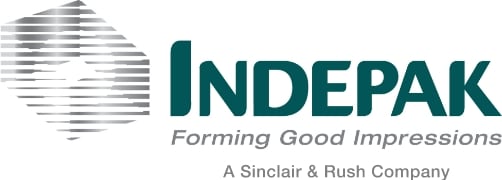At Indepak, virtually all of our plastic packaging can be recycled. While some items can just be tossed into the recycling bin, other items need to be handled a bit differently. Here’s a quick list of recycling tips that might help you learn the best ways to ensure that your recyclables are handled correctly.
1. Look At The Numbers
All thermoform plastic packaging and bottles should have a number surrounded by a triangle somewhere on its surface. This number indicates the type of plastic that was used to create the packaging. Most curbside recycling programs will accept plastics that feature a number 1 or number 2, but many larger cities and metro areas will accept plastics number 1-7. Your recycling trash bin might have information stamped on it, letting you know which plastics are accepted. Otherwise, head to the website of your refuse company to find out which plastics are allowed in the bins.
2. Make Recycling Easier
Whether you own a home or a business, there are ways to make it easier for your family or co-workers to recycle. Place two trash bins in your kitchen and label on for trash and one for recyclable items. You can even go further and have two trash cans and a covered bin for compostable materials, such as vegetable scraps, egg shells, loose leaf tea, coffee grounds, stale bread, peanut shells, cooked pasta and much more. You can either create compost to use in your yard and garden or toss these items in your green waste trash can.
For businesses, you can set out several recycling bins and label these bins so that people know what items can be recycled, such as plastic or glass bottles, copy paper, cardboard and other recyclable items. If you aren’t sure what items can be recycled, we again recommend that you go to your local refuse company’s website, and this should have all of the information you need.
3. Think Beyond Your Kitchen
Many homeowners keep their trash bins in the kitchen, which makes a good deal of sense. After all, the kitchen generates quite a bit of waste. But when you think about what can be recycled, don’t forget to think about items such as detergent and shampoo bottles, liquid soap containers and other items from the laundry room and bathrooms in your home. There’s plastic packaging in most rooms of our homes, so be sure to recycle items from areas beyond the kitchen.
4. Your Local Stores Can Help
Many items, such as plastic grocery bags, bread bags, zipper bags and the plastic wrap that surrounds multiple plastic water bottles, can be recycled. Many stores, especially grocery stores, will collect these bags and plastic film items and send them to special facilities where they can be recycled. Collect these items in a box or paper bag and drop them off at your local store once per week. These plastic film items should not be placed in your general recycling bin.
5. Avoid The Landfill
Plastic packaging obviously is not the only substance that can be recycled. Items such as copy paper, newspaper, cardboard, glass and aluminum usually can be placed into your recycling bin. If you aren’t sure, do a bit of research to determine what can be recycled in your area. The goal is to reduce the amount of trash that is sent to our landfills, but, of course, there are some items that should not be disposed of in the recycle bin, the green waste bin or the regular trash bin. These include items such as electronics, light bulbs, batteries, motor oil and paint.
Many auto supply stores will take your old motor oil, and some paint stores will take old cans that still contain paint. For electronic waste, many communities will have special days when you can dump old computers, TVs and other e-waste for free at a specific location. Some communities allow you to throw used batteries and light bulbs into the regular trash bin, and some do not. Certain types of light bulbs, especially compact fluorescent bulbs, often must be taken to a special facility for disposal. Many retail stores these days, however, have places where you can drop off used bulbs and even batteries.
If you are in need of custom plastic packaging, we can help you find the most sustainable and eco-friendly options available. For more than 50 years, the team at Indepak has been committed to making quality plastic packaging as well as doing so in the most responsible and sustainable way possible.





